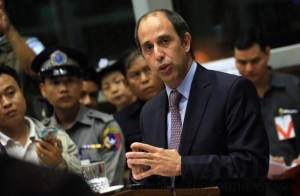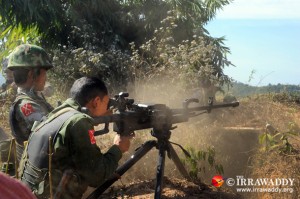Posts Tagged ‘Tomas Ojea Quintana’ (81 found)
Burma Government Must Prevent Ongoing Communal and Religious Violence by Tackling Impunity
 This week, United Nations Special Rapporteur on the situation of human rights in Burma, Tomás Ojea Quintana, reported that during his recent 10-day official mission to Burma his convoy was besieged by anti-Muslim protestors in Meikhtila, Mandalay Region, the scene of anti-Muslim violence in March of this year. However, the week’s unrest did not stop there: a few days later, Buddhist mobs burnt down dozens of shops and homes belonging to Muslims in Kantbalu, Sagaing Region, after a Muslim man was arrested for allegedly attempting to rape a Buddhist woman. Unfortunately, such incidents in Burma are nothing new: 2013 has seen outbreaks of religious and communal violence afflicting increasing numbers of towns across the country. Violence flared up most notably in Meikhtila on 20 March, lasting for more than a week, and also on 28 and 29 May in Lashio, Shan State, where one Muslim was killed and four Buddhists injured, and on 29 May in Mone, Kyauk Gyi Township, Pegu Region, where mobs destroyed a mosque and a madrasa. In addition, nearly 250,000 people, the majority of whom are Muslims, have been displaced by the violence across the country thus far […]
This week, United Nations Special Rapporteur on the situation of human rights in Burma, Tomás Ojea Quintana, reported that during his recent 10-day official mission to Burma his convoy was besieged by anti-Muslim protestors in Meikhtila, Mandalay Region, the scene of anti-Muslim violence in March of this year. However, the week’s unrest did not stop there: a few days later, Buddhist mobs burnt down dozens of shops and homes belonging to Muslims in Kantbalu, Sagaing Region, after a Muslim man was arrested for allegedly attempting to rape a Buddhist woman. Unfortunately, such incidents in Burma are nothing new: 2013 has seen outbreaks of religious and communal violence afflicting increasing numbers of towns across the country. Violence flared up most notably in Meikhtila on 20 March, lasting for more than a week, and also on 28 and 29 May in Lashio, Shan State, where one Muslim was killed and four Buddhists injured, and on 29 May in Mone, Kyauk Gyi Township, Pegu Region, where mobs destroyed a mosque and a madrasa. In addition, nearly 250,000 people, the majority of whom are Muslims, have been displaced by the violence across the country thus far […]
Whose Guns Are Silent?
 As President Thein Sein once again claimed success in the peace process, the United Nations Special Rapporteur on the situation of human rights in Burma, Tomás Ojea Quintana, was denied permission to visit the active warzone in Kachin State, illustrating the gap between words and reality.
As President Thein Sein once again claimed success in the peace process, the United Nations Special Rapporteur on the situation of human rights in Burma, Tomás Ojea Quintana, was denied permission to visit the active warzone in Kachin State, illustrating the gap between words and reality.
In President Thein Sein’s address for swearing in new deputy ministers on 15 August, he stated that “the guns have gone silent,” echoing his remarks on his visit to the UK in July where he asserted that “very possibly, over the coming weeks, we will have a nationwide ceasefire and the guns will go silent everywhere in Myanmar for the first time in more than 60 years.” The reality is that the guns of the Burma Army are far from silent, and the ethnic people, particularly in Kachin State and northern Shan State, are suffering more under Thein Sein than the previous military regime headed by Than Shwe […]
Myanmar: UN Special Rapporteur in Official Visit to Assess Human Rights Situation Countrywide
The United Nations Special Rapporteur on the human rights situation in Myanmar, Tomás Ojea Quintana, will undertake an official visit to the country from 11 to 21 August 2013. It will include visits to Rakhine State, Kachin State, Shan State, Chin State and Meikhtila in Mandalay Region […]
• • •Myanmar: UN Expert Welcomes Latest Release of Prisoners of Conscience, but Raises Alarm over Ongoing Arrests
The United Nations Special Rapporteur on the human rights situation in Myanmar, Tomás Ojea Quintana, has welcomed the latest presidential amnesty on 23 July resulting in the release of 73 prisoners of conscience, while raising concerns over ongoing arrests of activists […]
• • •Myanmar: UN Expert Greets Abolition of Notorious Border Security Force in Rakhine State and Calls for Accountability
The United Nations Special Rapporteur on the human rights situation in Myanmar, Tomás Ojea Quintana, today welcomed the abolition of Nasaka, the notorious border security force operating in Rakhine State. He urged the authorities to investigate and hold accountable those members of the force responsible for human rights abuses […]
• • •UN Myanmar Expert: Fatal Shooting of Rohingya Women the Latest Product of Impunity
The United Nations Special Rapporteur on the human rights situation in Myanmar, Tomás Ojea Quintana, today said that the fatal shooting last week of three Rohingya women participating in a peaceful protest in Rakhine State is the latest shocking example of how law enforcement officials operate with complete impunity there […]
• • •UN Myanmar Expert: Fatal Shooting of Rohingya Women the Latest Example of Impunity
The United Nations Special Rapporteur on the human rights situation in Myanmar, Tomás Ojea Quintana, today said that the fatal shooting last week of three Rohingya women participating in a peaceful protest in Rakhine State is the latest shocking example of how law enforcement officials operate with complete impunity there […]
• • •UN Expert Urges Myanmar to Act on Local Regulations Targeting Rohingya Muslims in Rakhine State
Myanmar must respond unambiguously to the revival of a local order limiting the number of children that Rohingya Muslims can have to two, or face fines and prison sentences under section 188 of the Myanmar Penal Code. The call comes from the UN Special Rapporteur on the human rights situation in Myanmar, Tomás Ojea Quintana […]
• • •Myanmar/Rakhine Commission: “Positive Starting Point but Government Must Address Impunity”
The United Nations Special Rapporteur on the human rights situation in Myanmar, Tomás Ojea Quintana, today welcomed some forward thinking recommendations from the Rakhine Investigation Commission report. However, he expressed concerns over the lack of recommendations to address impunity and ensure investigations into credible allegations of widespread and systematic human rights violations targeting the Muslim community in Rakhine State […]
• • •Religious Violence in Myanmar, the Consequences of Government Inaction in Tackling Prejudice and Discrimination – UN Expert
The United Nations Special Rapporteur on the human rights situation in Myanmar, Tomás Ojea Quintana, today expressed serious concerns over the spread of violence between Muslim and Buddhist communities in Myanmar and urged bold steps by the Government to counteract this frightening trend […]
• • •








 All posts
All posts